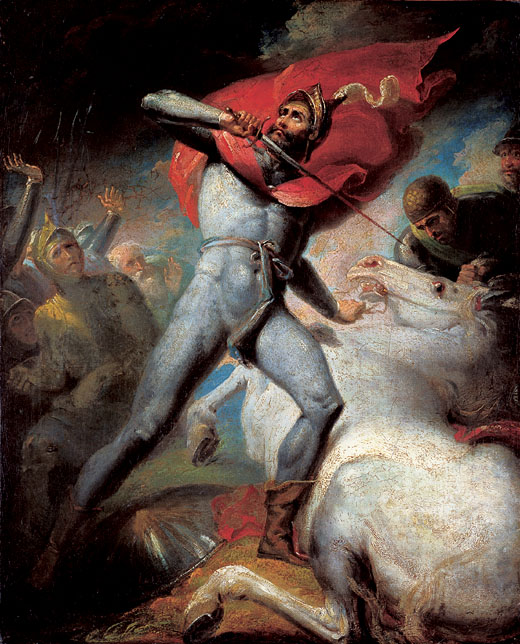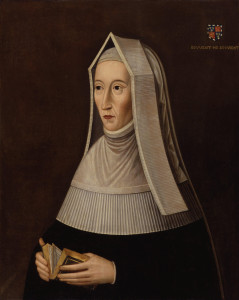The young Margaret of Somerset became the greatest heiresses of her era; but her phenomenal wealth made her a pawn to politics.
I’m hardly the first Royal History Geek to be fascinated by Margaret Beaufort. The matriarch’s struggles, hardships and triumphs are the things that epics are made of.
A widowed mother at 13. A fifth column in the final days of the Yorkist regime. Against all the odds, her valiant efforts put her descendants on the throne. They’ve remained there ever since.
But even before the Wars of the Roses broke out, Margaret was a figure of note to contemporaries. Thanks to the early tragedy of her father’s death, the young Margaret inherited the bulk of the Beaufort fortune.
But just how wealthy was the young Margaret of Somerset? Did her wealth place her among the upper reaches of England’s nobility? Had she been a man, would her fortune have made her a major military player in the dynastic wars that dominated her life?
As so often with Margaret Beaufort questions, we must turn to the academic study by Michael K Jones and Malcolm G Underwood. In these pages, the young heiresses’ lands are explored in detail. Thanks largely to the fortune of her late grandmother, who was co-heiress to the earldom of Kent, by 1450 it was clear that Margaret wielded a fortune of approximately £1000 a year.
On its own, this doesn’t tell us much. Such a figure would be no great income today. How far did a grand go in the 1450s?
To get some sense of an answer we must wind the clock back to seven years before Margaret’s birth. Ahead of a new tax to fund the war with France, all landowners were assessed and their annual income calculated. The findings have come down to us.
If Margaret were alive in 1436 and in possession of her fortune, she would have ranked among the top 20 landowners. Given that there were about 60 titled families at any one time, this placed Margaret in the upper-third of noble society. Those with lands to the value of £25 a year were deemed wealthy enough to tax. Margaret’s income was 40 times that sum.
However, we need to be very, very careful about this. Seven years is a long time. Income from land was subject to the stewardship of the landlord and, at least to some extent, market forces.
Furthermore, it’s clear from other evidence that the rich then – like the rich today – had gone to some length to disguise the extent of their wealth.
As an indication however, it remains illuminating. Chris Given-Wilson, the great late-medieval historian, estimates that an earl would typically enjoy £1000-1500 a year. This is clearly the category that Margaret was in. Nonetheless, money was not always so logically linked to title. Some earls – such as Devon, Westmoreland and Suffolk – seemed to have less. Some could claim considerably more. There were also a handful of wealthy barons who enjoyed fortunes greater than some earls.
Margaret, however, did not have an income worthy of a major power broker. If we take numbers from the 1436 list, add together the various titles and estates that were consolidated in the late 1430s and 1440s, we get a sense as to who the major players were at the beginning of the Wars of the Roses.
The Duke of Buckingham enjoyed almost £3000 a year, the Duke of York £3500 and the mighty Earl of Warwick £4,400. As stated earlier, these figures should be taken as conservative. Studies on the Duke of Buckingham for example, suggest his income was double this sum – at least in some years.

Margaret’s wealth was both extraordinary and unremarkable. What made it so significant was her sex. It was unusual – thought not unique, even in her own time – for a woman to be in sole possession of such a staggering sum. And that staggering sum, of course, was up for grabs by a future husband.
Under the common law of primogeniture, women would only inherit a parent’s fortune if they were devoid of a brother. The eldest son would typically inherit the lot. But when there was more than one daughter (and no son) the girls had to share it out equally.
Great landowners hated the idea of daughters inheriting. This was not out of pure misogyny. They loathed the thought of their estates being divvied up among daughters and used to bolster the ambitions of the lesser Lords their girls would marry. As a result, many deployed legal devises – such as entails – to block female inheritance.
For whatever reason, the Beauforts never deployed such a devise. As her father’s sole surviving legitimate child, Margaret’s status as a major heiress was established within the first two years of her life.
Money was important to Margaret. When her son seized the throne, she would be granted plenty more of it. But this early fortune would lead to trauma. Before she was seven years old, she was abandoned to the machinations of the medieval marriage market. Her money, along with her trickle of royal blood, made her a pawn of politics from her earliest years.
Thank goodness that the matriarch of the Tudors was a born survivor.
Subscribe to our newsletter!



